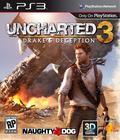What keeps me up nights with a stack of deep, fully realized and fairly long holiday season games to review is not that I won't finish the games in time, or that finishing them will turn out a lot of drudgery punctuated by few highlights. What keeps me up nights is that once I've finished one of these highly anticipated, beautiful and big-budget blockbusters, I won't have anything meaningful to say about it. I'm not quite to that point yet, but in places, Uncharted 3: Drake's Deception got me about as close as I've ever been.
Uncharted 3 is great. You should go buy it. It's full of stellar gameplay sequences, fine visual detail and varied, awesome scenery. The story is good. The voice acting in cut scenes is vastly superior to most games on the market. The pace never dropped to the point I wanted to put it away for good, yet there was quite a bit of time in more than nine hours of single-player campaign during which I realized I was being reasonably entertained for a reasonable price, but that and nothing more. Much of Uncharted 3 is like a Michael Bay movie: You'll enjoy the hell out of the special effects and amped-up production values, but within a couple of weeks of seeing it, you probably won't have much to say about it.
I loved Uncharted: Drake's Fortune, the first in the series, because, at the time, there was nothing like it in current-generation console games, and what I remembered from previous generations came up short in comparison. Uncharted was almost certainly suggested by "Raiders of the Lost Ark," but rather than relying wholly on that standard-bearer from the movie medium, it was instead informed by the same classic source material in pulp novels, comics and B-grade adventure movies. Because it was a video game, and it reworked this mass of great pop culture source material into an engaging, playable adventure, it was a true original.
I fell head over heels for Uncharted 2: Among Thieves because, for all its originality, Uncharted was flawed. I loved Uncharted 2 for shoring up the weak spots of the original game both in narrative delivery and gameplay. While Uncharted 3 does everything head and shoulders above most of its peers, and handily meets or exceeds Uncharted 2 in visuals, early on, it's a lesser game than its immediate predecessor.
In some ways, the third in the series seems like a throwback to the original game in that it revives flaws that were in large part killed off with the second title. Uncharted: Drake's Fortune features a rather notoriously frustrating, overlong wet-bike sequence. Drake's Deception includes a scene where you have to get some place, and although that place is your obvious goal, it's not immediately evident how to get there. The environment makes it somewhat difficult to take stock of your surroundings and find the path you seek. When you finally find it, on your own or via the game's progressively more revealing hints, there's a brief cut scene that yanks the rug right out from under you. Now you have to get to that same goal location, but in an entirely different way. I was left feeling like the only point of the initial pathfinding was to artificially extend gameplay time. Good narrative games are based on well-integrated interactivity and a sense of accomplishment when you do things the right way. I did everything right, but my reward was tantamount to a slap cross the cheek for failing. This sort of all-gone-to-hell trickery works in adventure movies, but it's rarely appreciated in games — even games with such strong cinematic influences as the Uncharted franchise.
Uncharted 3's narrative manages to progress the established fiction without doing any disservice to longtime fans. Intrepid fans are frequently an impasse to fresh creativity when telling any story in any medium. Naughty Dog nimbly skips over this roadblock, renewing appearances by major characters but rounding them out all the more. Drake's Deception returns focus to the duo of Drake and Sully — the game also reveals a lot of the pair's history — but there's plenty of room for the Uncharted leading ladies and some new faces. Nathan Drake certainly seems wiser, and even a little older. The voice actors for the four principal characters reprise their roles, doing perhaps their best work of the series.
As expected, the focus of Uncharted 3 is adventure and discovery, this time centered on "the Atlantis of the Sands," a legendary civilization of Arabia lost long ago in the middle of an impassable desert. Of course, the desert turns out to be not quite so impassable. As Nathan figures, Sir Francis Drake once traveled there and then for mysterious reasons covered his tracks down to the mere notion he'd ever tried to find the place. Most of the game is devoted to solving the riddle of the city's location, while exploring and holding off nefarious elements in London, provincial France and urban Syria. The scenery is exceptionally varied and a lot to look at; there's no game backdrop like an Uncharted backdrop. The lush orchestral score underwrites almost every moment of intrigue, discovery and combat.
For the most part, the fighting in the game is an incremental enhancement to Uncharted's formula: the same or similar weapons in the same perspective with the same cover system. The new title includes more hand-to-hand combat without firearms and implements what Naughty Dog calls "contextual melee." If you never play through a hand-to-hand scene twice or attempt melee attacks in the midst of firearm combat, you might think the fighting sequences, heavily cued by Quick Time Events (QTEs), are just lightly interactive cut scenes. But play around with it, throw some bad guys around and jump them in different corners, and you'll see: It works and it is truly contextual. The scheme is spectacular to watch, but unfortunately doesn't add much to the overall gameplay. Nathan has killed a lot of people in the two previous games, so forcing him to spare attackers by pummeling them unconscious seems no better than shooting them in the face. The extended fighting sequences, besides displaying enjoyable choreography, only serve to lengthen gameplay time in a game that really doesn't need extra elbow room.
Drake's Deception is alternatively enthralling, thrilling, boring and annoying. In any other team's hands, this likely would have resulted in a mediocre game, but this is Naughty Dog. There are brilliant sequences sprinkled throughout. Unfortunately, a few of them become developer darlings and are repeated once or twice more than is necessary. At two-thirds of the way through the single-player campaign, Uncharted 3 gains the crest of a tall wave and rides it all the way in. This title would have benefited from a couple of hours of cuts, achieving no more than a seven- or eight-hour initial playthrough on normal difficulty; but my early mounting litany of grievances all evaporated in the climactic chapters as action and adventure became more perfectly balanced, key plot elements reached resolution, various cats were let out of the bag, and the big question marks of the interpersonal relationships met with satisfying answers.
Some things have been cut from Uncharted 3. Notably, all the unlockable treats for toying around with in-game graphics and physics are gone. Naughty Dog explained that these features, like world-mirroring and low gravity, would have been too hard to implement this time around. Personally, I doubt there's much on a PlayStation 3 these developers would find too hard to implement. More likely it was a time and effort consideration. There are core gamers who loved these "cheat code"-style throwbacks to legacy platforming adventures, but the majority of current-gen gamers play through the single-player campaign for entertainment and to finish the story, and then they'll put away the solo portion of the game. I'm sure it made more sense to put leftover development resources into Uncharted 3's multiplayer modes rather than interesting but trivial physics hijinks.
For a game viewed by fans as "not much of a multiplayer game," Drake's Deception's sure has a lot of quality multiplayer in it. There are co-op and competitive game modes supported online via PSN, and also LAN play. Whereas the multiplayer in Uncharted 2 surprised me by being so much fun, the new game's multiplayer impressed me with how well it integrates gameplay mechanics of the single-player campaign.
The included maps are heavily based on environments from within the scripted chapters of the single-player campaign. Rather than come off as redundant, this is more welcome than anything: If you've played through the campaign, you already have a substantial head start on learning the multiplayer layouts.
When creating Uncharted 2's multiplayer modes, Naughty Dog realized they couldn't make an Uncharted multiplayer setup without including some of Nathan's signature platforming abilities. The tricks were in, sometimes in limited form, but those skills weren't really necessary for performing well in multiplayer matches. It was primarily a shooting escapade, like any other. But in the third game's multiplayer modes, in large part because the maps are more or less the campaign levels, the platforming element substantially crosses over from solo play.
Beyond the enhanced multiplayer gameplay deeply incorporating elements of what makes this series so unique, there's a lot of customization and leveling up available, too. I will, at little risk to my reputation for prescience, predict that Uncharted 3 will never have the large multiplayer following of Xbox 360-exclusive Halo or Gears of War titles, but just because it won't doesn't mean it doesn't deserve it. Playing on an enemy team, it's definitely disconcerting to see an opposing Nathan and Elena racing toward you, guns blazing, but that's only a testament to how attached we are to the game's narrative fiction. There's plenty of competitive and cooperative gameplay, beyond the all-important story-based campaign, to keep most fans coming back to Uncharted 3 until the next game in the franchise hits store shelves.
I could ask for better in the manner in which Uncharted 3: Drake's Deception gets rolling, but once the ride hits full speed, it never disappointments. A few plot threads are unraveled and never sewn up again, but one of these, undoubtedly the most significant, has obviously been left out of the weave with intent, to be explained in greater detail somewhere down the line of Nathan Drake's continuing saga. Without giving it away, I'll leave this small hint from the tale of another great fictional explorer: "Indiana was the dog's name."
Score: 9.0/10
More articles about Uncharted 3: Drake's Deception











 Uncharted 3: Drake's Deception blurs the entertainment boundaries, delivering the cinematic scale, adrenalin rushes, thrills and mystery that are the Uncharted trademark, together with its unique and enhanced multiplayer experience.
Uncharted 3: Drake's Deception blurs the entertainment boundaries, delivering the cinematic scale, adrenalin rushes, thrills and mystery that are the Uncharted trademark, together with its unique and enhanced multiplayer experience.








































